Shea butter is an incredibly versatile ingredient with a wide range of uses and benefits for the skin and hair. Derived from the nuts of the shea tree, this natural butter has been used for centuries for its nourishing and moisturizing properties. Packed with essential vitamins and fatty acids, shea butter is suitable for all skin types and offers numerous advantages for skincare and haircare routines. With its anti-inflammatory, antioxidant, and antibacterial properties, shea butter can help improve the overall health and appearance of your skin and hair.
Key Takeaways:
- Shea butter is a versatile ingredient with multiple benefits for the skin and hair.
- It provides moisturization, soothes inflammation, and offers antioxidant and antibacterial properties.
- Shea butter helps boost collagen production, reduces the appearance of scars, stretch marks, fine lines, and wrinkles.
- It can be used for various skin conditions such as eczema, dermatitis, and psoriasis.
- Shea butter contributes to sunburn relief, hair health, and promoting a healthy scalp.
Shea Butter for Skin Care
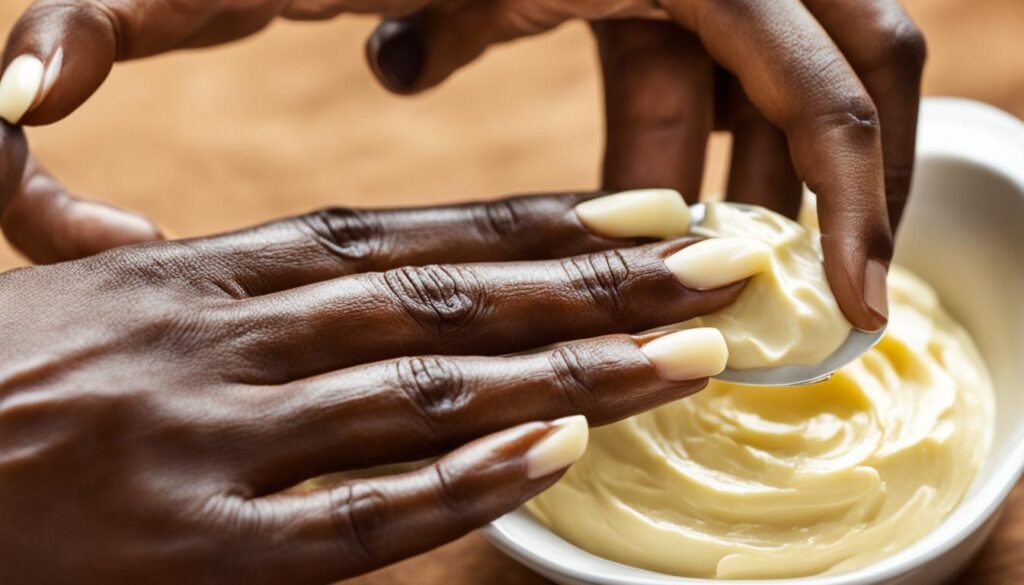
Shea butter is a popular choice for skincare due to its moisturizing and nourishing properties. It helps improve skin moisture by restoring lipids and creating a protective barrier against dryness. This makes it beneficial for dry and sensitive skin, and it can also soothe and reduce inflammation caused by conditions like eczema and dermatitis.
Shea butter can be applied directly to the skin or used in the form of lotions, creams, and balms. It is commonly used for facial skincare, as it helps promote cell regeneration, reduce the appearance of fine lines and wrinkles, and maintain a youthful complexion. Additionally, shea butter is effective in reducing stretch marks and scars, thanks to its ability to soften scar tissue and improve skin elasticity.
When it comes to caring for your skin, shea butter is a versatile and valuable ingredient. Its moisturizing, soothing, and anti-aging properties make it a great addition to your skincare routine, helping you achieve healthier, more radiant skin.
The Benefits of Shea Butter for Skin Care:
- Moisturizes and nourishes the skin
- Restores skin moisture and creates a protective barrier
- Soothes and reduces inflammation
- Promotes cell regeneration
- Reduces the appearance of fine lines and wrinkles
- Improves elasticity and reduces stretch marks and scars
Shea butter is a versatile and valuable ingredient for skincare. Its moisturizing, soothing, and anti-aging properties make it a great addition to your skincare routine.
Shea Butter for Hair Care

When it comes to hair care, shea butter is a valuable ingredient that offers numerous benefits. Its moisturizing and nourishing properties can help prevent hair breakage and strengthen the hair strands, making them less prone to damage and breakage.
Shea butter is especially beneficial for those with curly or porous hair types. It helps retain moisture, keeping the hair hydrated and reducing frizz. By applying shea butter directly to the hair or using it in hair masks, conditioners, and styling products, you can enhance the overall health and appearance of your hair.
Additionally, shea butter has potential antifungal properties that can help treat dandruff and protect the scalp from infections. This can promote a healthy scalp, which is essential for optimal hair growth.
To summarize, shea butter is a versatile ingredient that can benefit all hair types. It moisturizes, nourishes, and protects the hair, making it an excellent addition to your hair care routine.
| Benefits of Shea Butter for Hair Care: |
|---|
| Prevents hair breakage |
| Strengthens hair strands |
| Retains moisture and reduces frizz |
| Treats dandruff and protects the scalp |
With shea butter, you can achieve healthier, stronger, and more manageable hair.
Shea Butter for Sun Protection

While shea butter cannot replace sunscreen, it does offer additional sun protection due to its natural SPF of 3 to 4. This provides a small level of defense against harmful UV rays, making it beneficial for skin health. Shea butter can be used in conjunction with sunscreen to provide added moisturization and nourishment to the skin, enhancing the overall sun protection routine.
One of the key benefits of shea butter is its emollient properties, which help prevent moisture loss from the skin. This can be particularly soothing for sunburned skin, as it helps to alleviate dryness and promote healing. Regular use of shea butter as part of a skincare routine may help maintain skin health and minimize potential sun damage.
Shea butter provides a small level of sun protection and can be used in conjunction with sunscreen for added moisturization and nourishment.
Shea Butter for Acne Treatment
Contrary to common belief, shea butter can be beneficial for acne-prone skin. It helps balance the skin’s natural oil production, preventing excessive sebum production that can clog pores and lead to breakouts. The anti-inflammatory properties of shea butter help reduce redness and irritation associated with acne. Additionally, shea butter’s antibacterial properties may help combat acne-causing bacteria on the skin. By using shea butter as part of a skincare routine, individuals with acne-prone skin can experience improved skin texture and reduced breakouts.
How Shea Butter Helps with Acne Treatment
Shea butter has several properties that make it effective in treating acne:
- Oil Balancing: Shea butter helps regulate the skin’s natural oil production, preventing the overproduction of sebum that can clog pores and cause acne.
- Anti-Inflammatory: The anti-inflammatory properties of shea butter help reduce redness, inflammation, and irritation associated with acne.
- Antibacterial: Shea butter contains antibacterial compounds that may help combat acne-causing bacteria on the skin’s surface.
- Moisturizing: Despite its thick texture, shea butter is non-comedogenic and can help provide moisturization without clogging the pores.
By incorporating shea butter into your skincare routine, you can target acne-causing factors and promote healthier, clearer skin.
“Using shea butter for acne has been a game-changer for me. It helps calm my breakouts and reduce the redness and irritation. Plus, it leaves my skin feeling moisturized and smooth.”
– Vanessa, skincare enthusiast
How to Use Shea Butter for Acne
To effectively use shea butter for acne treatment, follow these steps:
- Cleanse your face with a gentle cleanser and pat dry.
- Take a small amount of shea butter and warm it between your palms until it melts.
- Gently massage the melted shea butter onto the affected areas of your face.
- Allow the shea butter to absorb into your skin for a few minutes.
- Follow up with your regular moisturizer or facial oil, if desired.
For best results, incorporate shea butter into your daily skincare routine. Monitor how your skin responds and adjust the amount of shea butter used based on your skin’s needs.
| Benefits of Shea Butter for Acne |
|---|
| Regulates oil production to prevent clogged pores |
| Reduces redness, inflammation, and irritation |
| Combats acne-causing bacteria on the skin |
| Provides moisturization without clogging pores |
Using shea butter as part of your acne treatment can help address multiple factors contributing to breakouts and promote clearer, healthier skin. However, it’s important to note that results may vary for individuals, and it’s always recommended to consult with a dermatologist for personalized skincare advice.
Shea Butter for Healing Wounds and Scars
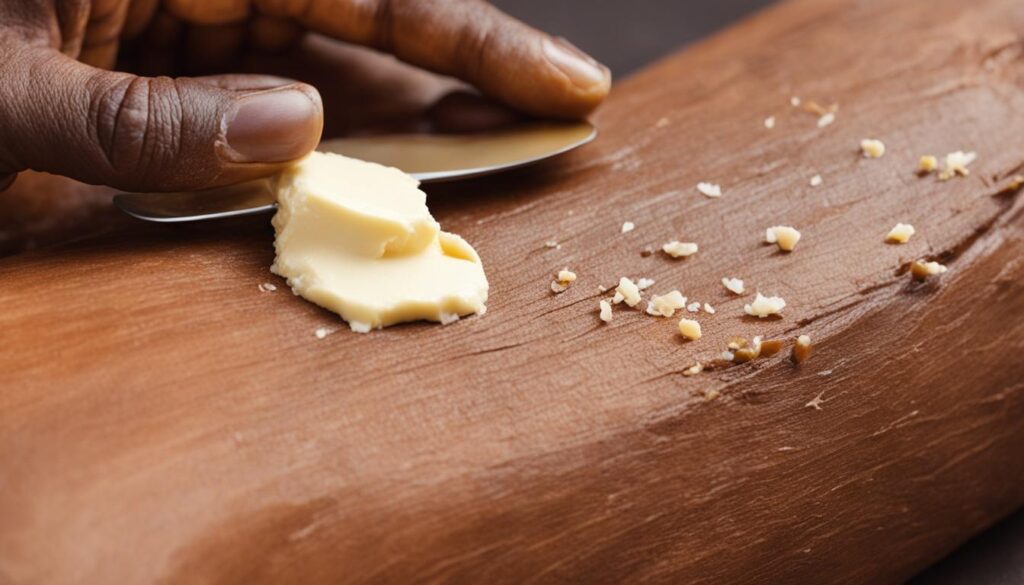
Shea butter is well-known for its healing properties and can be highly effective in promoting wound healing and reducing the appearance of scars. With its moisturizing effects, shea butter helps soften scar tissue and improve overall skin texture, making it an essential ingredient in scar treatment.
Regular application of shea butter to wounds or scars can accelerate the healing process and minimize the visibility of scars. Its anti-inflammatory properties help soothe irritated skin, while its antioxidant properties protect the skin from further damage. Whether it’s a cut, scrape, or surgical scar, shea butter can contribute to the healing process and improve the appearance of the skin.
In addition to its healing benefits, shea butter also provides deep hydration to the skin, helping it stay moisturized and nourished. This can be particularly beneficial for wound healing, as hydrated skin tends to heal faster and form healthier tissue.
“Shea butter has been a game-changer for my scars. After a recent surgery, I started applying shea butter regularly, and I can’t believe how much my scars have faded. It’s truly amazing.” – Emily, satisfied customer
When using shea butter for wounds or scars, it’s important to choose a high-quality, unrefined product to ensure maximum effectiveness. Look for raw and organic shea butter, as it retains the most beneficial properties. You can also find shea butter in various forms, such as creams, lotions, and balms, making it easy to incorporate into your skincare routine.
Below is a table summarizing the benefits of shea butter for wound healing and scar reduction:
| Benefits of Shea Butter for Wound Healing and Scar Reduction |
|---|
| Accelerates the healing process |
| Softens scar tissue |
| Improves overall skin texture |
| Soothes irritated skin |
| Protects the skin from further damage |
| Provides deep hydration |
Try incorporating shea butter into your skincare routine for effective wound healing and scar reduction. You’ll be amazed at the results!
Shea Butter for Anti-Aging
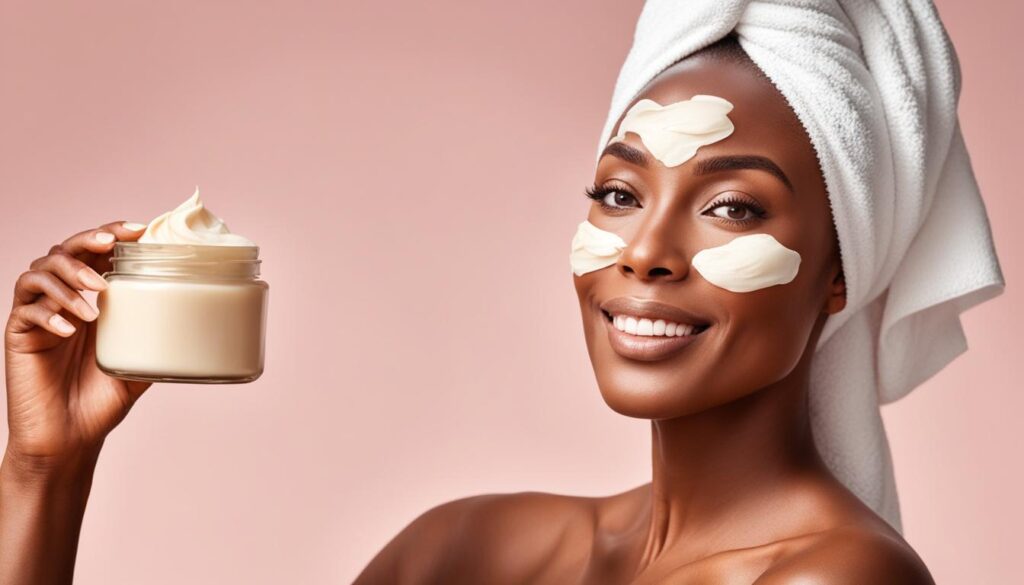
Shea butter is a natural powerhouse when it comes to combating the signs of aging. Packed with antioxidants and nourishing fatty acids, it rejuvenates the skin and helps diminish fine lines and wrinkles. The powerful antioxidant properties of shea butter protect the skin from harmful free radicals, preventing premature aging and maintaining a youthful appearance.
One of the key benefits of shea butter for anti-aging is its ability to boost collagen production. Collagen is a protein that gives the skin its strength and elasticity. As we age, collagen production naturally decreases, leading to the formation of fine lines and wrinkles. Shea butter helps stimulate collagen production, improving skin firmness and reducing the appearance of aging signs.
When applied topically, shea butter deeply moisturizes the skin, providing intense hydration and improving skin texture. It nourishes the skin cells, restoring their vitality and promoting a smoother, more youthful complexion.
Experience the anti-aging power of shea butter by incorporating it into your skincare routine. From facial moisturizers to anti-aging serums, there are various products available that harness the benefits of shea butter for aging skin. Embrace the natural goodness of shea butter and say goodbye to fine lines and wrinkles.
Key Benefits of Shea Butter for Anti-Aging:
- Promotes skin rejuvenation
- Reduces the appearance of fine lines and wrinkles
- Boosts collagen production for improved skin elasticity
- Protects against free radicals and prevents premature aging
- Deeply moisturizes and nourishes the skin
How to Use Shea Butter for Anti-Aging:
- Cleanse your face and pat it dry.
- Take a small amount of shea butter and warm it between your palms.
- Gently massage the shea butter onto your face and neck, focusing on areas with fine lines and wrinkles.
- Leave it on overnight or use it as a part of your daytime skincare routine.
- For best results, use shea butter regularly and consistently.
Caution:
It is important to perform a patch test before using shea butter, especially if you have sensitive skin or known allergies. If any irritation or allergic reaction occurs, discontinue use and consult a dermatologist.
Shea Butter for Soothing Skin Conditions
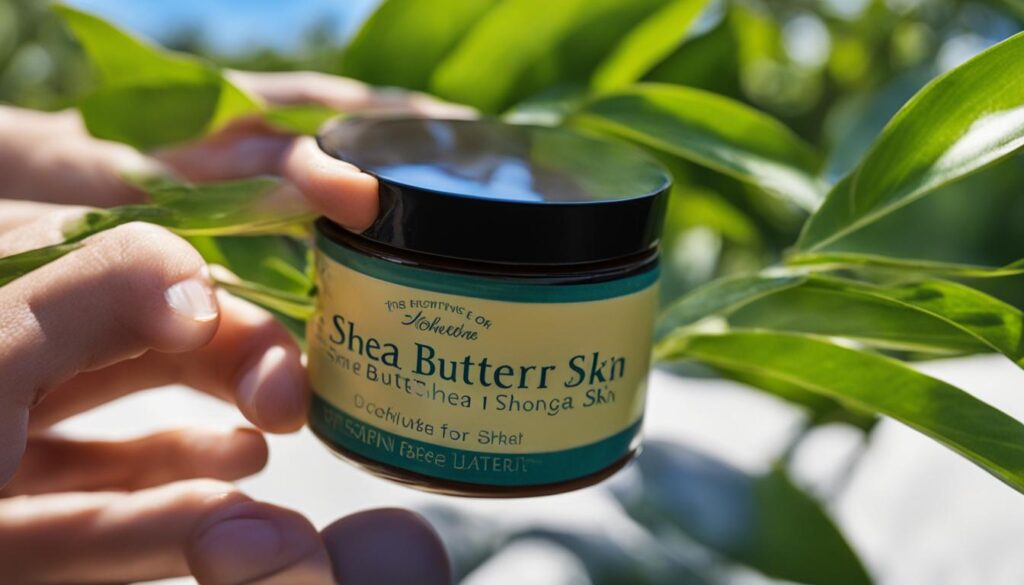
Shea butter is a natural ingredient known for its calming properties, making it highly effective in soothing various skin conditions. Whether you’re dealing with eczema, dermatitis, or psoriasis, shea butter can provide relief by reducing inflammation and itchiness, while also nourishing the skin.
One of the key benefits of shea butter is its moisturizing effects. It helps restore the skin’s natural barrier, preventing moisture loss, which is crucial for individuals with chronic skin conditions. By keeping the skin hydrated, shea butter helps alleviate dryness and discomfort.
Using shea butter as a standalone treatment or in combination with other recommended treatments can yield optimal results. Its gentle and nourishing properties make it suitable for sensitive and irritated skin.
Benefits of Shea Butter for Skin Conditions:
- Reduces inflammation and soothes itchiness
- Restores the skin’s natural barrier to prevent moisture loss
- Alleviates dryness and discomfort
- Gentle and nourishing for sensitive and irritated skin
Shea butter can be applied directly to the affected areas or used in the form of creams, lotions, or balms specifically formulated for skin conditions. With its soothing properties, shea butter helps calm and heal the skin, promoting overall skin health.
“Using shea butter as part of your skincare routine can provide much-needed relief for eczema, dermatitis, and psoriasis.” – Dr. Emily Thompson, Dermatologist
A Homemade Remedy for Eczema:
You can create a simple and effective homemade remedy for eczema using shea butter. Combine equal parts of shea butter and coconut oil and melt them together in a double boiler. Once melted, remove from heat, let it cool slightly, and apply it to the affected areas. This mixture provides hydration and soothing relief for eczema-prone skin.
| Conditions | Benefits |
|---|---|
| Eczema | Reduces inflammation and itchiness |
| Dermatitis | Restores the skin’s natural barrier |
| Psoriasis | Alleviates dryness and discomfort |
Shea butter is a versatile and gentle solution for those struggling with eczema, dermatitis, and psoriasis. Its natural properties provide relief and comfort, helping to soothe and restore problem skin. Incorporating shea butter into your skincare routine can make a significant difference in managing these conditions.
Shea Butter for Sunburn and Irritation
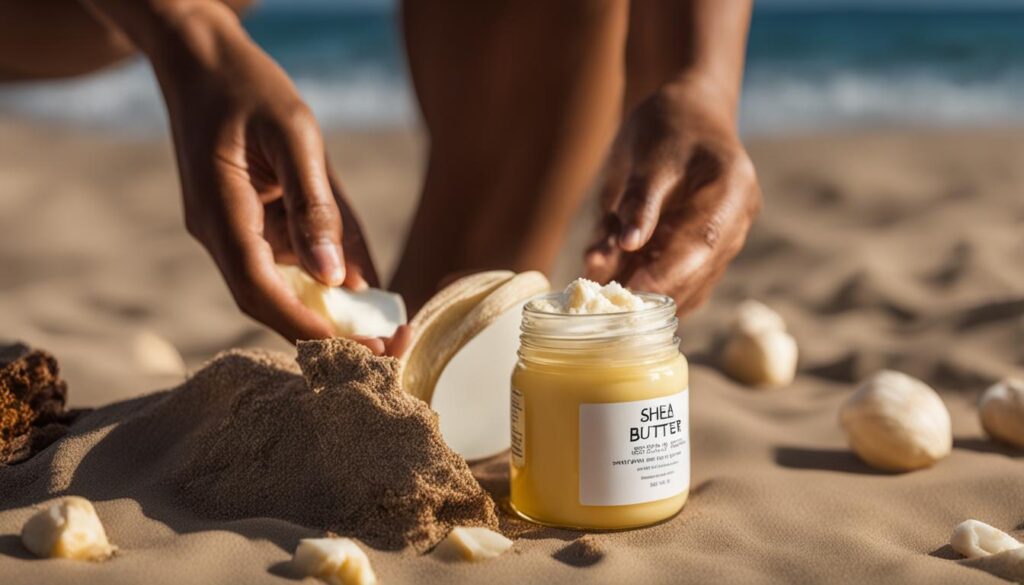
Shea butter’s moisturizing and anti-inflammatory properties make it an ideal choice for soothing and repairing sunburned or irritated skin. It helps reduce redness, inflammation, and discomfort associated with sunburn and other forms of skin irritation. Shea butter’s emollient properties create a protective barrier that seals in moisture and promotes healing.
Applying shea butter to affected areas can provide relief, reduce peeling, and promote the regeneration of healthy skin cells. Its natural ingredients and nourishing qualities make shea butter a gentle and effective solution for sunburn care. However, it is important to note that shea butter should not be used as a substitute for sunscreen. Instead, it can serve as a moisturizing and soothing complement to regular sunburn care.
When using shea butter for sunburn and skin irritation, follow these tips:
- Ensure the affected area is clean and dry before applying shea butter.
- Take a small amount of shea butter and gently massage it into the skin until fully absorbed.
- Repeat the application as needed for relief and moisturization.
In addition to its sunburn-soothing properties, shea butter offers numerous benefits for overall skin health. Its nourishing qualities, vitamins, and fatty acid content contribute to improved hydration, reduced inflammation, and enhanced skin elasticity. Incorporating shea butter into your skincare routine can help maintain a healthy and radiant complexion.
Shea Butter for Hair and Scalp Health
In addition to its benefits for the skin, shea butter also promotes hair and scalp health. Its moisturizing properties help nourish and hydrate the scalp, preventing dryness and flakiness. This can be especially beneficial for individuals dealing with dandruff or a dry scalp. Shea butter can also help reduce scalp inflammation and soothe itchiness caused by conditions like seborrheic dermatitis. By incorporating shea butter into haircare products or using it directly on the scalp, individuals can maintain a healthy scalp and promote stronger, shinier hair.
Benefits of Shea Butter for Hair and Scalp:
- Moisturizes and nourishes the scalp
- Prevents dryness and flakiness
- Reduces scalp inflammation
- Soothes itchiness
- Promotes healthier, shinier hair
Using shea butter regularly can help improve scalp and hair health, providing essential moisture and soothing properties for a healthier, more vibrant mane.
Whether it’s added to shampoo, used as a deep conditioning treatment, or applied directly to the scalp, shea butter is a natural and effective solution for maintaining optimal hair and scalp health. Its rich concentration of vitamins and fatty acids nourishes the hair follicles, promoting hair growth and strength. Shea butter also helps protect the scalp from environmental damage and serves as a natural conditioner, leaving the hair soft, manageable, and less prone to breakage.
| Benefits | How to Use |
|---|---|
| Moisturizes and nourishes the scalp | Apply a small amount of shea butter directly to the scalp and massage gently. Leave it on for a few hours or overnight, then rinse thoroughly. |
| Reduces scalp inflammation | Combine shea butter with a few drops of tea tree oil or lavender oil. Apply the mixture to the scalp, leave it on for 30 minutes, then wash it off with a mild shampoo. |
| Soothes itchiness | Mix shea butter with aloe vera gel and apply it to the scalp. Leave it on for 20 minutes, then rinse well. Repeat as needed. |
| Promotes healthier, shinier hair | Warm a small amount of shea butter between your palms and apply it evenly to damp hair. Style as usual. |
How to Select and Store Shea Butter
When it comes to choosing the right shea butter for your needs, opt for a high-quality, unrefined product to ensure you reap the maximum benefits. Look for raw and organic shea butter, as these varieties retain the most advantageous properties. The color of shea butter can range from off-white to yellow, depending on the processing method used.
Proper storage is essential to maintain the effectiveness of shea butter. To preserve its quality, store it in a cool and dry place, away from direct sunlight. This helps prevent heat exposure, which can degrade its beneficial compounds. To safeguard its potency, make sure to keep the container tightly sealed, preventing the entry of moisture or contaminants.
With proper storage, shea butter has a long shelf life, allowing you to utilize it for an extended period and enjoy its nourishing properties for an extended time.
Tips and Cautions for Using Shea Butter
When it comes to using shea butter, there are a few important tips and cautions to keep in mind for a safe and effective experience. To maximize absorption, always apply shea butter to clean, dry skin or hair. Starting with a small amount is recommended, and you can gradually increase the amount if needed. Gently massage the shea butter into your skin or hair until it is fully absorbed.
It’s crucial to avoid applying shea butter to open wounds or broken skin, as it may cause irritation or discomfort. In general, shea butter is considered safe for most people; however, if you have a nut allergy, it is essential to perform a patch test before using shea butter to ensure that you do not have an allergic reaction. If any adverse reactions occur, discontinue use and consult a healthcare professional.
Remember that shea butter can have different consistency depending on the temperature. In cooler temperatures, it may be more solid and require warming between your hands before applying. In warmer temperatures, it can have a softer, more easily spreadable texture.
Following these tips and cautions will help you make the most out of using shea butter, promoting healthy skin and hair without any unwanted side effects or complications.
FAQ
What are the uses and benefits of shea butter?
Shea butter is a versatile ingredient that offers numerous benefits for the skin and hair. It can be used for moisturizing, soothing various skin conditions, reducing the appearance of scars and stretch marks, promoting hair health, providing sun protection, and fighting the signs of aging.
How can shea butter benefit the skin?
Shea butter is beneficial for the skin as it provides moisturization, soothes dry and sensitive skin, reduces inflammation, promotes cell regeneration, improves skin elasticity, and helps reduce the appearance of stretch marks and scars.
How can shea butter benefit the hair?
Shea butter is beneficial for the hair as it helps moisturize and nourish the strands, reducing breakage and promoting stronger, shinier hair. It also helps retain moisture, reduce frizz, and promote a healthy scalp.
Can shea butter provide sun protection?
While shea butter cannot replace sunscreen, it does offer some additional sun protection with its natural SPF of 3 to 4. It can be used in conjunction with sunscreen for added moisturization and nourishment to the skin.
Is shea butter suitable for acne-prone skin?
Yes, shea butter can be beneficial for acne-prone skin. It helps balance oil production, reduces inflammation, and has antibacterial properties that can help combat acne-causing bacteria on the skin.
Can shea butter help heal wounds and reduce the appearance of scars?
Yes, shea butter has healing properties that can promote wound healing and reduce the visibility of scars. Its moisturizing, anti-inflammatory, and antioxidant properties help soften scar tissue, improve skin texture, and accelerate the healing process.
How can shea butter contribute to anti-aging skincare?
Shea butter contains antioxidants and fatty acids that promote skin rejuvenation, boost collagen production, improve skin elasticity, and reduce the appearance of fine lines and wrinkles. Regular use of shea butter can help improve skin firmness, texture, and overall complexion.
Can shea butter help soothe skin conditions like eczema and psoriasis?
Yes, shea butter has soothing properties that can provide relief for eczema, dermatitis, and psoriasis. Its moisturizing effects restore the skin’s natural barrier, reduce inflammation, and alleviate itchiness associated with these conditions.
Can shea butter be used for sunburn and skin irritation?
Yes, shea butter can help soothe and repair sunburned or irritated skin. It reduces redness, inflammation, and discomfort, and its emollient properties seal in moisture and promote healing for sunburned or damaged skin.
How does shea butter benefit hair and scalp health?
Shea butter moisturizes and nourishes the scalp, preventing dryness and flakiness. It can help reduce scalp inflammation, soothe itchiness, and promote stronger, shinier hair.
How should I select and store shea butter?
When selecting shea butter, choose a high-quality, unrefined product. Look for raw and organic shea butter. Store it in a cool, dry place away from direct sunlight, tightly sealed to prevent moisture or contamination. If stored properly, shea butter has a long shelf life.
Any tips and cautions for using shea butter?
When using shea butter, apply it to clean, dry skin or hair for maximum absorption. Start with a small amount and massage it gently until fully absorbed. Avoid applying to open wounds or broken skin. Perform a patch test if you have nut allergies, and discontinue use if any adverse reactions occur.






